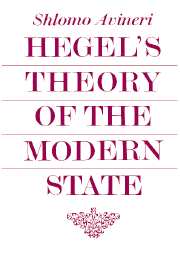Book contents
- Frontmatter
- Contents
- Title in the Series
- Preface
- 1 Beginnings
- 2 Positivity and Freedom
- 3 The Modernization of Germany
- 4 The New Era
- 5 Modern Life and Social Reality
- 6 The Owl of Minerva and the Critical Mind
- 7 The Political Economy of Modern Society
- 8 Social Classes, Representation and Pluralism
- 9 The State – the Consciousness of Freedom
- 10 War
- 11 The English Reform Bill – the Social Problem Again
- 12 History – the Progress towards the Consciousness of Freedom
- Epilogue
- Bibliography
- Index
6 - The Owl of Minerva and the Critical Mind
Published online by Cambridge University Press: 05 June 2012
- Frontmatter
- Contents
- Title in the Series
- Preface
- 1 Beginnings
- 2 Positivity and Freedom
- 3 The Modernization of Germany
- 4 The New Era
- 5 Modern Life and Social Reality
- 6 The Owl of Minerva and the Critical Mind
- 7 The Political Economy of Modern Society
- 8 Social Classes, Representation and Pluralism
- 9 The State – the Consciousness of Freedom
- 10 War
- 11 The English Reform Bill – the Social Problem Again
- 12 History – the Progress towards the Consciousness of Freedom
- Epilogue
- Bibliography
- Index
Summary
After two years in Heidelberg, Hegel moved to Berlin in 1818, where he stayed as professor of philosophy until his death in 1831. It is this association with Prussia which was to cause so much adverse comment from later critics.
The first to castigate Hegel for accommodation with Prussia was Rudolf Haym, in his Hegel und seine Zeit (1857). At the time of the publication of Haym's volume, Prussia appeared as the arch-enemy of German unification, and Haym, a veteran of the abortive Frankfurt National Assembly of 1848, attacked Hegel as both a pro-Prussian reactionary and an enemy of German nationalism. When a decade and a half later Prussia emerged as the champion of German national unification through ‘blood and iron’, this new role of Prussia reflected on Hegel who suddenly appeared, especially in many English works, as an advocate of German nationalism.
Much of this rests on anachronistic interpretations of historical facts as well as on backward projections of the meaning of ‘Prussia’ and ‘Prussianism’. To Haym, an 1848 nationalist and liberal, Prussia was the bastion of reaction, conservatism and anti-nationalism; hence Hegel, who had been associated with it, was equally guilty. To twentieth-century English writers, ‘Prussianism’ was, on the contrary, the evil force of German nationalism and militarism; hence Hegel's connection with it made him, in some way, responsible for Nazism. The changing role of Prussia in the context of German nationalism created, therefore, a new image of Hegel's politics.
- Type
- Chapter
- Information
- Hegel's Theory of the Modern State , pp. 115 - 131Publisher: Cambridge University PressPrint publication year: 1972
- 1
- Cited by

